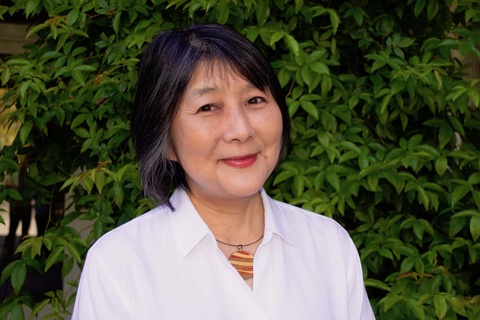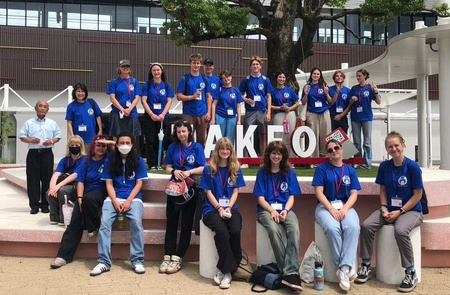
Japanese people who "don't know about Japan"
In October 2023, when I participated in a workshop organized by the California-Japan Sister Cities Network at the Consulate General of Japan in Los Angeles as a member of the Los Angeles-Nagoya Sister City Committee, I had the opportunity to meet people from various cities in California who are working on exchanges with Japanese sister cities. I also met Megumi Mizutani, president of the California-Japan Sister Cities Network, whose role is to promote exchanges between these sister city organizations, for the first time, and was interested in how she came to start such a sister city organization and what her purpose in originally coming to the United States was. As a result, three months after the workshop, I was able to talk to Megumi, who is based in Sebastopol, Northern California, online over the weekend.
Megumi was born and raised in Tokyo, and after graduating from a Japanese university and getting a job at a foreign financial company, she moved to the United States in the early 1990s to receive training at the New York head office, and has remained in the U.S. for over 30 years. I asked her about her impressions of America, and New York in particular, when she first arrived.
"What surprised me was that people would ask someone like me for directions on the streets of New York. I had heard that America was a free country, but when I actually came here, I realized it was a place full of diversity that couldn't be categorized into a single set of values."
In 1992, Megumi moved to Northern California to attend graduate school. While there, she got married and became the mother of two children. Her life changed dramatically after she started volunteering at her children's school.
"I was initially asked to give a talk about Japanese culture at my child's preschool. I tried using crafts and other methods to attract the children's attention, and was thrilled at how attentive they listened. At the same time, I was shocked to find that I couldn't answer their simple questions about Japan. In other words, I was in culture shock at my own lack of deep knowledge of Japanese culture. When asked about Japanese festivals, I couldn't answer the meaning or history behind them. I didn't even know the meaning of each of the dishes in osechi cuisine. That's why I realized that in order to convey Japanese culture, it's important for me to first study it myself."
Sister city relationship between Sebastopol and Takeo
Sebastopol, where Megumi still lives, is said to be a pro-Japanese community with many people interested in Japan.
"The Japanese American community is also very active. Although I'm Japanese but not Japanese American, I decided to get involved in the Japanese American community in Sebastopol for the sake of my children, who are second-generation Japanese American. So in 2004 I started a culture camp to teach local Japanese American, Japanese people, and American children who are interested in Japan about Japanese culture and let them experience it. I made sure to explain the meaning at its roots. I held the camp every summer for 10 years, gathering 30 to 40 children, and I'm proud to say that in total I have nurtured about 400 fans of Japanese culture."
And as an extension of hosting culture camps and Japanese festivals, sister city exchanges await.
"Sevastopol has sister city partnerships with the city of Chikhilin in Ukraine and the city of Takeo in Saga Prefecture, Japan. When my son's friend visited Takeo as part of a sister city exchange, the child's mother asked me to translate a thank-you letter into Japanese. When I read the letter, I was impressed by how such a deep friendship could be developed simply by a child staying with a family in a sister city, so I began to get involved in managing the sister city exchange with Takeo. Through my sister city activities, I came to realize that each person involved in the exchange plays an important role as a citizen diplomat. By staying with a family in a country with a different culture, you can start your own family in that country. No one wants to fight the country where their family lives."
At first glance, sister city exchanges and world peace may seem like distant goals. However, Megumi emphasized that it is actually a steady but sure way to achieve them, and I felt a deep sense of empathy for her.
If you take action, you can change the world
Megumi also shared an episode from the past about the relationship between the people of Sebastopol and Japanese Americans.
"During World War II, approximately 120,000 Japanese people were sent to internment camps. Most of them were unable to return to their homes after the war, but I heard that the Japanese people of Sebastopol were able to return to Sebastopol after leaving the internment camps because the local people looked after their fields and homes while they were away. From this history, I learned about the role that nameless citizens played in my hometown long before the intercultural exchange movement, and the power that can be created by connections between people. Having learned this, I was strongly attracted to the concept of sister city peace activities through citizen diplomacy, as I was searching for what I, as a citizen, could do to prevent wars like those from happening again.
"I hope that the relationship between Japan and the United States will remain good, and that my children will be able to freely go to Japan and return to the United States whenever they like. That's why I want to promote citizen diplomacy by getting involved in sister city activities, and ultimately connect that to world peace, and I've made that my life goal."
Thus, five people from Northern California, including Megumi, started the aforementioned California – Japan Sister Cities Network. After lobbying the Consulate General of Japan in San Francisco in 2018, the organization gained support from the Consulate General of Japan in Los Angeles in Southern California, and as of 2024, it is mainly engaged in workshops to connect sister city organizations between California and Japan.
"By holding the workshop online during the COVID-19 pandemic, not only were we able to bring together people involved with sister cities from all over California, but our Japanese counterparts were also able to participate. It's not a membership-based event, so anyone who wants to participate can join each event." At the workshops, participants actively exchange information and discuss challenges and solutions for sister city activities, such as fundraising and succession issues.
What's even more surprising is that all of this work is done on a volunteer basis, without pay. In fact, Megumi also has a full-time job as an employee of a non-profit organization involved in special medical diets. It's easy to imagine that she doesn't have enough time to work on the California-Japan Sister Cities Network and her full-time job, but she is still able to continue because, "When I was in Japan, I would dream of things like, 'I wish this could happen,' but I never thought about taking action. But in America, I realized through my experience that I can change the world by taking action." Finally, when I asked, "How many people are you, Megumi?" she answered, "I'm a Japanese person who has lived in America for over 30 years and still continues to learn about Japan."
Website: California – Japan Sister Cities Network
© 2024 Keiko Fukuda






